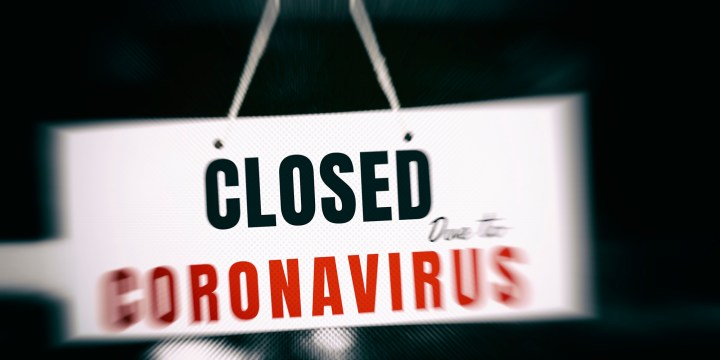BUSINESS MAVERICK
Real estate investors face dividend drought

Income investors have been left reeling in recent weeks as several JSE-listed real estate companies have deferred the payment of dividends worth nearly R5bn to shore up their balance sheets against the Covid-19 disruption.
Michael* is a 72-year-old pensioner who relies on dividends declared by JSE-listed real estate companies to fund the golden years of his life.
Unlike other asset classes on the JSE, real estate companies, or real estate investment trusts (Reits) guarantee investors regular dividend payments. This is something that appealed to Michael because he wanted a consistent income stream during his years of retirement.
“My wife and I, who have both retired, receive a big part of our pension money directly from the dividends declared and paid by Reits. Without this regular income, our livelihoods will be affected,” the Johannesburg-based pensioner told Business Maverick.
Their livelihoods have already been affected because, in recent weeks, a number of Reits have decided to defer the payment of interim dividends to a later stage.
The disruption of Covid-19 has pushed some companies to preserve cash in order to shore up their balance sheets instead of rewarding investors with regular dividends. Reits that have adopted this position – by either cancelling previously declared dividends or postponing the payment of dividends – include Redefine Properties, Hyprop Investments, SA Corporate Real Estate and Octodec Investments.
The deferred or cancelled dividend payments to investors, including withholding tax due to the South African Revenue Service (SARS) by Reits, amounts to nearly R5-billion (see below table).

Source: Financial results of Reits. Compiled by author
Reits, which own shopping malls, office properties, warehouses, and other types of properties that are occupied by businesses (or tenants), usually pay out dividends to investors from rental income they generate. Reits are required by law (such as the Income Tax Act) to pay at least 75% of their distributable income as dividends to investors within four months of their financial year-end period. Companies that don’t comply with this requirement stand to lose their Reit status, and associated tax benefits such as the dividends declared being taxed by SARS in the hands of investors, not the companies.
Covid-19 lockdown hits Reits
Since Reit and associated tax laws were introduced in 2013, companies have usually gone beyond the 75% minimum requirement by paying 100% of their distributable income to investors as dividends. But this is all about to change.
The closure of non-essential businesses such as restaurants and clothing retailers during the hard Covid-19 lockdown — over five weeks, starting 27 March — affected their ability to pay rent. And if tenants struggle to pay rent, the rental income of Reits will be impacted, curtailing their ability to pay dividends to investors.
Reits have approached the JSE for help, saying the lockdown could affect their ability to comply with the bourse’s listings requirements including paying regular dividends to investors.
Reits want permission from the JSE to defer the payment of interim dividends to a later stage, which the JSE is assessing on a case-by-case basis. A real estate executive, who was part of the discussions, said some Reits want the payment of dividends to be suspended for two years or to pay less than 50% of their distributable income as dividends instead of the prescribed minimum of 75%.
“But I don’t think Reits will get these requests approved by the JSE. There are so many people, such as pensioners, who are invested in Reits and rely on dividends for income,” the executive told Business Maverick.
The executive questioned the intention behind deferring dividend payments by Reits, saying some are doing it for nefarious reasons.
“Some of this undertaking by Reits might be opportunistic because they want distressed balance sheets to improve by keeping cash and not paying dividends. It is easy and wrong to let investors bear the brunt. There was a campaign in 2011 for property companies to get a Reit status and allow the average man on the street to invest in property and get a regular income stream. To not pay a dividend is mischievous.”
It’s prudent to not pay dividends
Keillen Ndlovu, the head of listed property funds at Stanlib, said Reits have no choice but to postpone dividend payments because they cannot sell assets to free up cash and shore up balance sheets. Selling assets would be futile especially in a Covid-19 market where there’s no buying activity.
The raising of capital by Reits through issuing new shares is not an option, given the market volatility, said Ndlovu. And Reits asking commercial banks for more debt will prove to be difficult considering that their debt levels against the value of their assets is breaching the uncomfortable 40% level.
“The cash retained is meant to keep them going and it’s all about survival in this environment. They all want to pass the liquidity test as well as the solvency test. It’s important to note that the ones with higher debt levels will suffer the most in this market,” he said.
Ian Anderson, the chief investment officer at Bridge Fund Managers, supported Ndlovu’s view, saying that it is prudent for Reits to defer dividend payments, adding that cash-flow dynamics of their tenants “have deteriorated and will remain under pressure while the lockdown remains in place”.
And the rental income of Reits will remain subdued as they won’t be able to pass inflation-beating rental increases to tenants.
“The consensus view is that lockdowns will be lifted slowly and the recovery in economic activity might take time, keeping pressure on cash flows. Given these heightened levels of uncertainty, it is prudent that the boards and management teams are looking to strengthen balance sheets, rather than satisfying the income requirements of their shareholders.” BM
*The full name is known to Business Maverick.



















 Become an Insider
Become an Insider